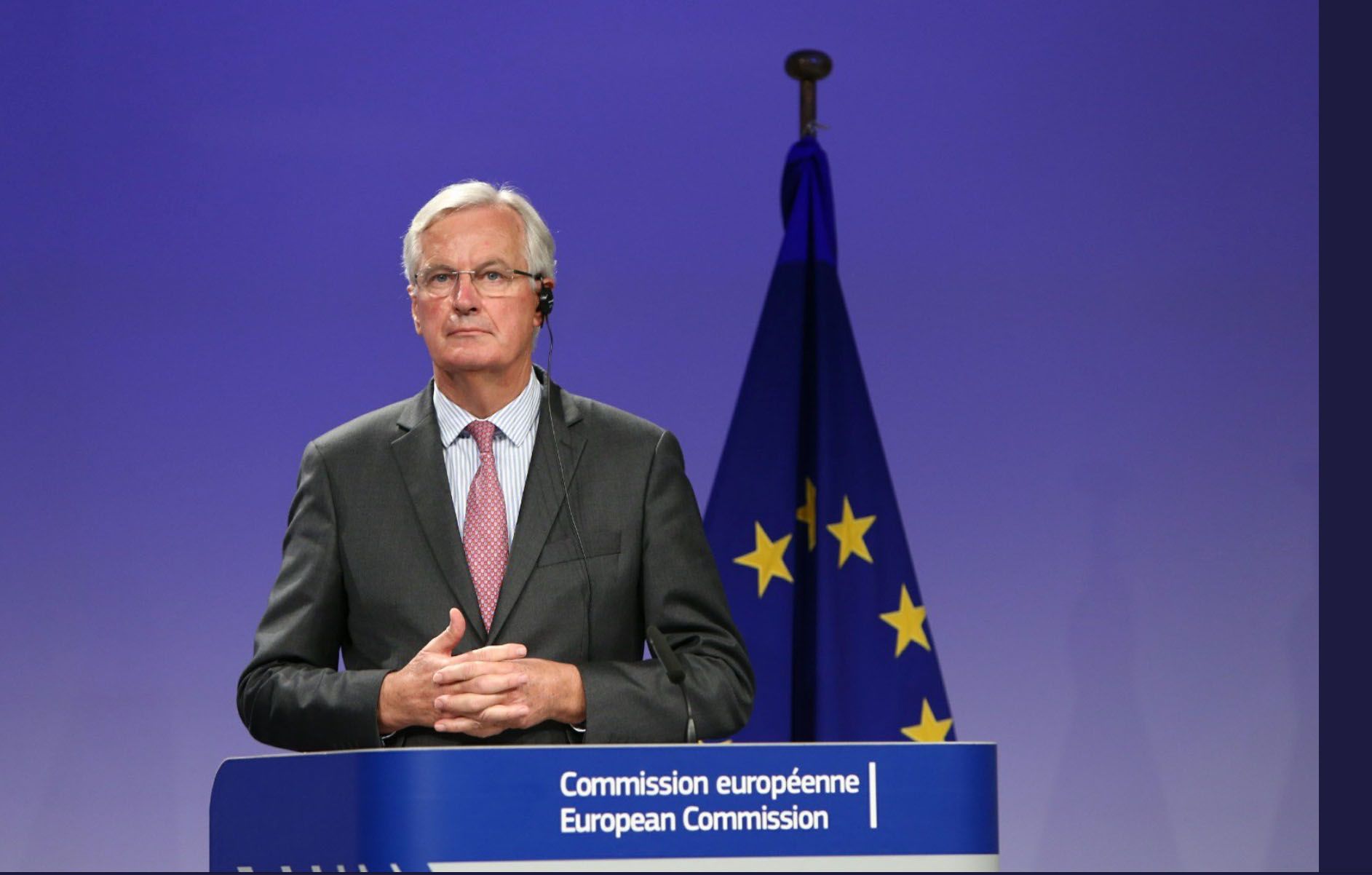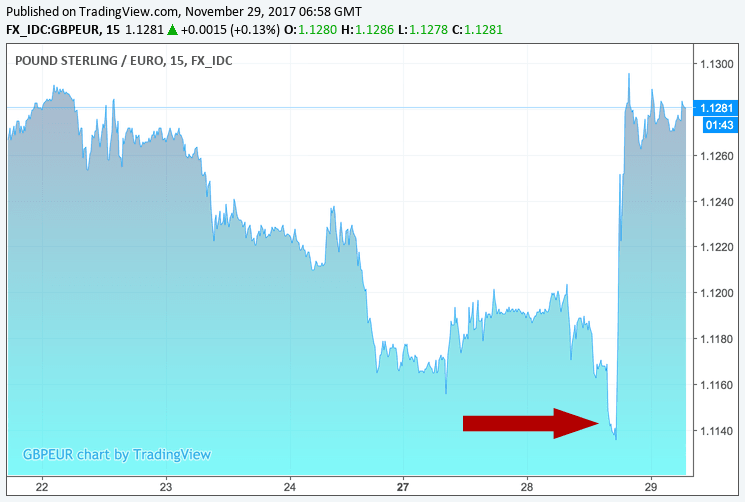Further Pound / Euro Exchange Rate Gains Likely say Analysts

Above: Michel Barnier, lead European Union Brexit negotiator. (C) European Council.
"Markets could get an early Christmas present: Progress to transitional and trade talks at the 14 December EU summit would be taken well by markets" - Kallum Pickering, Berenberg.
The Pound-to-Euro exchange rate is seen heading back towards the top of its recent range at 1.1378, but it could break to fresh multi-month highs before long we are told.
Driving a renewed confidence in the Pound at the time of writing is the observation Brexit negotiations finally look to be moving forward to the more important, substantive long-term issues surrounding trade and the future relationship.
The move is expected to unlock deadlock on negotiations and substantially lessens the prospect of a hard-Brexit - a scenario where the U.K. and E.U. part ways without having secured a deal.
Most analysts - and the market at large - believe this to be the worst-case-scenario for Pound Sterling on all timeframes.
Signs of progress have resulted in money-market expectations for the next Bank of England interest rate rise move forward from November 2018 to September 2018. In line with this shift in expectation, the Pound has rallied.
The Pound-to-Euro exchange rate is now trading at 1.1378, levels last seen on November 01.

Above: The Pound breaks higher against the Euro on news that the E.U. and U.K. are in agreement over the financial settlement.
But the progress made on negotiations has come at a cost with reports suggesting E.U. officials have stated that the UK has agreed to honour gross commitments worth around €100bn as part of its divorce settlement for Brexit.
Of course this money was always going to be paid by the U.K. were it to remain within the European Union, but the net number will probably come in around half of that once payments to the UK and other deductions are considered.
At this stage, though, no UK officials have confirmed this account.
While this might present some risk to the reliability of this news, as it follows on from UK Prime Minister Theresa May agreeing to increase the UK’s offer – by an unspecified amount - on the Brexit bill when she met with EU Council Leader Donald Tusk last Friday it is probably legitimate.
"This supports our call for a breakthrough in the Brexit negotiations soon," says Kallum Pickering, Senior UK Economist with Berenberg Bank.
Berenberg now expect UK PM Theresa May to present a formal offer on the Brexit bill, EU citizens rights, and the Irish border question at the upcoming 4 December dinner between May and EU Commission president Juncker.
Pickering expects the offer to meet the EU’s requirement for ‘sufficient progress’ on the Brexit divorce and if such progress is made, expect the UK and the EU to move negotiations on to potential transitional arrangements and post-Brexit trade at the 14-15 December EU Summit.
Get up to 5% more foreign exchange by using a specialist provider by getting closer to the real market rate and avoid the gaping spreads charged by your bank for international payments. Learn more here.
Irish Border Risks Remain, But Progress Increasingly Likely
Berenberg note that now the UK has dropped its hard-line view on the Brexit bill - the most contentious issue on the UK side - it signals that London is now serious about moving the talks forward.
As we have noted, the question of the Irish border has is now emerging as a preeminent risk to the progress of Brexit talks.
Ireland has threatened to veto the progression of talks unless a formal assurance from the UK that no hard border will be introduced between Northern Ireland and the Republic of Ireland is offered for when the UK leaves the EU in March 2019.
However, headlines here have also been supportive over the past 24 hours with a report in the Times confirming "Britain close to Irish border deal" which tells us there is little appetite amongst Irish leaders to delay talks if there is some hope of real progress.
"Expect the UK to strike the necessary compromise with Dublin to settle the Irish question soon," says Pickering.
As such, "markets could get an early Christmas present: Progress to transitional and trade talks at the 14 December EU summit would be taken well by markets."
Pickering adds that this early Christmas present could come in the shape of "a rebound in Sterling" and improved economic growth prospects.
Berenberg warn of upside risks to their near-term growth calls for the UK which currently see economic growth of 1.6% in 2018 and 1.7% in 2019.
The Times reports British officials tabled proposals this week to avoid a hard-border in Ireland that could unblock the last remaining major obstacle to a deal.
The Pound will have liked the observation that "EU leaders are preparing to offer a two-year Brexit transition deal as early as January after negotiators said that they were close to a breakthrough over the Northern Ireland border."
"GBP soared after the Times reported that negotiators are close to a breakthrough on the difficult problem of the Irish border. If the two sides agree, E.U. leaders reportedly could offer Britain a two-year transition arrangement as early as January. The news triggered a lot of stops that pushed the currency higher. This would be tremendously bullish for Sterling," says Marshall Gittler at ACLS Global.
Other strategists are also expecting the Pound to appreciate further should the current momentum concerning Brexit extend.
"The Pound would be stronger today were it not for that lingering uncertainty over the Irish border. Assuming this does not thwart progress, our year-end GBP/USD target of 1.3600-1.3700 is clearly achievable. Furthermore, levels over 1.4000 next year are also achievable based on actual economic growth being stronger than the building consensus of economic weakness in the coming year," says Derek Halpenny at MUFG.
Analyst Giulia Specchia at ANZ is also more optimistic on the Pound noting:
"Huge uncertainty is hanging over the UK economy as it transitions towards a new equilibrium outside the EU. But there are reasons to be cautiously optimistic on the outlook for sterling.
"Greater clarity around Brexit arrangements as 2018 progresses should boost wavering business confidence, employment and investment. Given that uncertainty has been the biggest driver of GBP weakness, a rise in certainty may well support Sterling."
Get up to 5% more foreign exchange by using a specialist provider by getting closer to the real market rate and avoid the gaping spreads charged by your bank for international payments. Learn more here.




